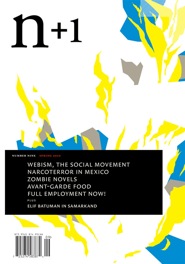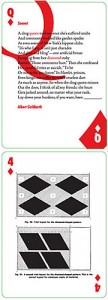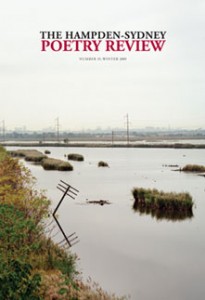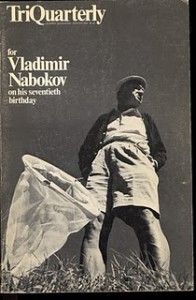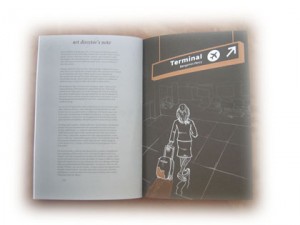Finnegan Flawnt is a fictitious writer and purveyor of fine podcasts, who lives under Milk Wood with two females and a bad conscience because of his continued deep social media procrastination. First published in June 2009, his flash fiction has appeared, or will appear in: Metazen, Bull, fourpaperletters, Foundling Review, Wrong Tree Review, divine dirt quarterly, elimae, Litsnack, notfromhereareyou, Rejection Digest and the Mad Hatter’s Review.
What story or book do you feel closest to?
Right now, I feel close to Hilary Mantel, whose collection learning to talk I picked up a couple of days ago. I only discovered Mantel a few months ago and I’m reading a little by her every day because I’m afraid I might run out of it – it’s like a drug, really, doesn’t happen often to me – last time, it was another British author, David Lodge, and before that I had a crush on Michael Chabon.
Books I feel closest to at all times include Ulysses by Joyce, The Idiot by Dostoyewsky, Der Stechlin by Fontane (a book little known outside of Germany where it was published in 1897, translated into English first in 1995), Mercier et Camier by Beckett, and anything by Gertrude Stein, Camus, Borges and others. This is a large collection whose members stand around me like the ancient monuments of Stonehenge: a burial ground, yes, but dead, no.
While I read Mantel breathlessly and without interruption, these others are more like good old friends: I look at and into them almost daily and come back refreshed and inspired.
Do you have a mentor?
Not as such. I’d like to think I’m too old for mentoring. (Is that true? Anybody out there willing to support an old geezer with a wheezing cough?) I’ve got many wonderful friends though, including a number of very talented and generous fictionauts from whom I continue go learn.
My parents supported my earliest writing: the first story I remember writing – in German – was called “Leopold Wundersam goes into inward emigration”. I was six years old then and I think my parents might have been afraid for my mental stability. I’d like to think I tapped into some collective unconscious Holocaust memory there. However, later my father persuaded me to learn a straightforwardly paying profession which is how I ended up getting a PhD in physics.
I was given the first and so far last direct literary mentoring at the end of my last masters exam. The mathematics (!) professor, whom I greatly admired, asked me what I wanted to do with my degree, and when I replied “I was going to get a PhD”, he said “I’m surprised. I always pictured you as a novelist.” I’d like to believe him.
How do you stay creative? What are your tricks to get “unstuck?”
Fortunately, I haven’t needed any tricks for quite a while, certainly not since I began publishing online. While it can be distracting at times, I find the almost continuous dialogue with readers most stimulating to my creativity. When I feel as if I’m sinking creatively, I go on “artist’s dates” as Julia Cameron calls them – usually involving non-verbal, non-written art – or I write “morning pages”, a tool recommended by Dorothea Brande, trance-like early morning writing in longhand that you don’t ever read again. On an ongoing basis, I need a musical cocktail while I write, which includes music that, to most people, sounds as if cats were tortured, like string music by John Cage or Michael Finnissy, or vocal music by the Hilliard Ensemble. I am also a great friend of Philip Glass, Terry Riley, John Adams and other minimalists – their music helps me float along during that first draft. When I feel more specifically stuck for words, any of the authors above will help me get afloat again, but Gertrude Stein, being a literary equivalent to the musical minimalists, is invariably helpful. I enjoy writing mini reviews, too, and though I have only recently begun, I have a hunch that the editorial work does support my own writing if only because it helps me get away from my own head.
Reading my own work and the work of friends and putting it out there as podcasts also keeps me going – another way of going away from the page that I find refreshing – with your own penchant for podcasting, I’m sure you know what I’m talking about.
My family has cabin in the woods where I go without a laptop as often as possible to write in longhand or simply sit around and watch it all happen rather than trying to pin it down with a pen. That gets me unstuck.
If nothing else helps, Ms Flawnt, who is an ex-editor, stands at the ready for a fight. We have a tumultuous relationship that pays off beautifully in creative terms.
What are your favorite websites?
I am a sucker for social media. I might be worse than you! I’m not only on facebook with a friend and a fan page, twitter etc. spend some time moderating a fledgling online flash fiction workshop of virtual writers and, since very recently, editing for the exquisite Metazen, which was also featured on fictionaut blog last month. Fictionaut is my most regular community hangout – especially with all the challenges – I even organised the St Patrick’s Day Challenge (in the Paddy Whacker group – a marvelous experience). Though I’ve got a couple of friends at Zoetrope, I’ve not really made use of the workshops there. Otherwise I put time into my own two online blogs for longer and for very short fiction. When I feel like I’m using all of these too much for procrastination – or when, like right now at the beginning of term, I’m totally out of time – then I take a break from all things web, usually for a few days, and go to our cabin.
What are you working on now?
In mid-February, I began to develop a distinct taste for the regular publication of flash (away from magazines) – and I’m still doing that, pretty much every day – it will keep me limbered up and creative while it’s fun, I guess.
A couple of mags that I respect have kindly asked me for contributions in the form of short prose and rather than throw something old (nothing I have is all that old) their way, I am working on these “commissions”, which is slow going because I am rather meticulous – I write quickly but I tend to agonise over tiny details for quite a while. I suppose it is also a way of teaching myself how to edit.
I have put the first draft of a novel that I bore under great pains last November (during NaNoWriMo) aside for the moment because I repeatedly fell asleep when trying to read it through – this began to look like a sign that I hadn’t found the right approach to the longer form yet. I am forever experimenting with different ways into the novel while trying not to lose my appetite for the very short story, which I have increasingly come to appreciate. An example is the cycle of flash pieces that I wrote at the end of 2009, which covers twenty-four time zones on Christmas day. These are the literary children that I currently nurse and rear.
Being in constant contact with such a great number of incredibly talented people – on fictionaut and elsewhere – has had a humbling effect on me and I rather like the idea of taking it more slowly now. Since English is not my mother tongue, I have more of a toolmaker’s attitude towards the language – in English, nothing comes natural to me: I have to work on the smallest detail and the tallest thought alike.
I am a great admirer of your video readings. Your voice strikes me as the voice of a trained actor, and even better – a voice-over natural. Have you dabbled in this area?
Likewise, Meg! I love what you do with video, color, background in addition to your voice. I get that a lot – the suggestion that I should go be a voice-over professional – very satisfying but about as useful as the suggestion to make money as an ass model (I’ve got nothing against ass models and I’ve got a great ass, Ms Flawnt says, so there’s another thing the world did not really need to know).
In fact, I used to want to be an actor for the longest time and briefly went to acting school as a young man. Later when working in London, I was Messerschmann in “Ring round the Moon” by Jean Anouilh, a delightful play, which was performed publicly in Saddlers Wells, a rather large, well known London venue, but I realised then and there that theatre wasn’t for me.
I don’t think I’d want to do what you do so well – appear on camera. But radio and voice work fascinates me and I have a drawer full of unfinished radio plays.
How in the world did you end up with over 4,000 twitter followers? I marvel… I have come to see you as a social media guru…
4744 followers as of today, to be exact – most of which undoubtedly are sales duds. Still, twitter drives traffic to my blogs and the re-tweeting mechanism is like a show of hands that lets me know if I’m going in a “readable” direction. Which is an interesting notion – the great temptation of social media for a writer is to write for instant gratification – so easy to obtain, and yet, how meaningful is it? I noticed that the number of people I can actually dialogue with hardly ever exceeds 10-20: this is just like in real life – and not so different from my experience on fictionaut either. The dialogue does sustain my writing. Since I’m not famous, it is also based on exchange of ideas, kindness, attention and critique – all of which keeps me on my toes.
As to how I got to that number of followers: I simply put the time in. Went on twitter around the same time that I began my literary blog so I worked the equation: presence + content = audience. Today, I rarely post more than 5 tweets a day, but when I started, I did a lot more.
Overall, social media is not free attention. I’ve been at this for a long time – more than twenty years in fact – and networking on any platform, virtual or real, takes time. For me at least an hour every day (a precious hour that I don’t write or rest or relate to my loved ones). You’ll only succeed if you enjoy doing it. I happen to prefer the web to going to cocktail parties. It got nothing to do with writing though it may be a road to getting published – I’m looking forward to finding that out!
I know that Flawnt is a pen name. How has having a pen name affected your life (positive and negative)? What has it allowed?
I originally developed Flawnt because I felt that he would allow me to say things I couldn’t say as the me that I already was in the world. I didn’t want anybody to come up to me and say “Hey, you crazy son of a gun, how dare you write about…” – though I’ve got tenure, I felt a little vulnerable. This part of the deal has worked out – only a few friends and family know my identity. Another positive effect has been the focus on the issue of existence and identity, which is the center of my moral interest as a writer. Flawnt also keeps me literary: I am forever looking at myself from the outside. My development of the “serious writer” character in a series of shorts is a result. A lot of my work is autobiographical but because of Flawnt it doesn’t look that way. I don’t know if that’s a good thing?
I’m not really aware of any negative aspect to working under a pseudonym – except the time lost having to explain and conceal myself simultaneously. My daughter doesn’t like the pseudonym though – I think she’s jealous because the father of one of her classmates is a famous writer.
For an “old geezer” you sure have spunk!!
Thanks very much. What a great word – “spunk”. I am actually not that old…age is one of the existential attributes I like to play with – old age leads to death – and Flawnt’s own ageless beauty (and his great ass) permits me to do this. The real me is neither young nor old, doesn’t smoke or drink or overindulge in anything except obsessive writing. Flawnt is “practically perfect in every way”, as his auntie, Mary Poppins, herself quite spunky, was fond of saying.
The Fictionaut Five is our ongoing series of interviews with Fictionaut authors. Every Wednesday, Meg Pokrass asks a writer five (or more) questions. Meg is an editor at Smokelong Quarterly, and her stories and poems have been published widely. She blogs at http://megpokrass.com.
 James Kaelan
James Kaelan